MercoPress. South Atlantic News Agency
Tag: bas
-
Monday, June 29th 2020 - 18:32 UTC
Sea ice in the Weddell Sea has decreased by one million sq kilometers in five years

Scientists have discovered that summer sea ice (*) in the Weddell Sea area of Antarctica has decreased by one million square kilometres – an area twice the size of Spain – in the last five years, with implications for the marine ecosystem. The findings are published this month in the journal Geophysical Research Letters.
-
Tuesday, February 18th 2020 - 06:38 UTC
Falklands' port development partner is also modernizing BAS Rothera station and a new wharf for RRS Sir David Attenborough
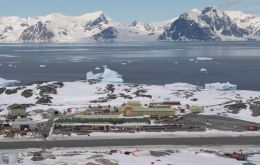
BAM Nuttall Ltd, which has been selected by the Falkland Islands Government, FIG, as the development partner to design and build a new port in Stanley Harbour is no adventurer in the South Atlantic and is closely linked to the UK efforts and investments in Antarctica. In effect, BAM Nuttall is involved in the building of the British Antarctic Survey's largest facility at Rothera Research station.
-
Friday, October 18th 2019 - 09:44 UTC
BAS technique to detect stranded whales from space
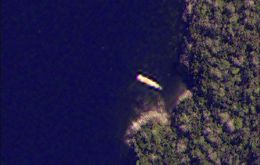
A new technique for analyzing satellite images may help scientists detect and count stranded whales from space. Researchers tested a new detection method using Very High Resolution (VHR) satellite images from Maxar Technologies of the biggest mass stranding of baleen whales yet recorded. It is hoped that in the future the technique will lead to real-time information as stranding events happen.
-
Friday, October 4th 2019 - 14:57 UTC
Falklands flagged, BAS latest incorporation: RRS Sir David Attenborough”

The Royal Research Ship RRS Sir David Attenborough, has been flagged to the Falkland Islands and officially named in a ceremony at Birkenhead, near Liverpool on Thursday September 26.
-
Thursday, April 25th 2019 - 09:30 UTC
Thousands of emperor penguin chicks died in 2016 destroyed by severe weather, reports a BAS team

Thousands of emperor penguin chicks drowned when the sea-ice on which they were being raised was destroyed in severe weather. The catastrophe occurred in 2016 in Antarctica's Weddell Sea. Scientists say the colony at the edge of the Brunt Ice Shelf has collapsed with adult birds showing no sign of trying to re-establish the population.
-
Friday, March 8th 2019 - 09:07 UTC
HMS Protector comes across an iceberg of 11 miles long and five wide
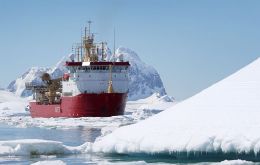
The Royal Navy’s Antarctic patrol ship encountered an iceberg the size of Bristol as she began her final scientific mission of the season. HMS Protector came across the enormous mass of ice and snow – 11 miles long and five wide – as she returned to the frozen continent for the last time this winter – or summer as it is in the Southern Hemisphere.
-
Monday, October 15th 2018 - 08:29 UTC
East Falkland, among most plastic contaminated shores in South Atlantic Islands
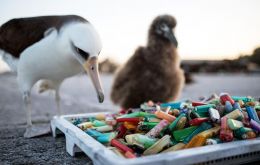
The amount of plastic washing up onto the shores of remote South Atlantic islands is ten times greater than it was a decade ago, according to new research published in the journal Current Biology. Scientists investigating plastics in seas surrounding the remote British Overseas Territories, including East Falkland, discovered they are invading these unique biologically-rich regions. This includes areas that are established or proposed Marine Protected Areas (MPAs).
-
Thursday, December 14th 2017 - 04:30 UTC
Mt Hope is the tallest mountain in the British Antarctic Territory with 3.239 meters
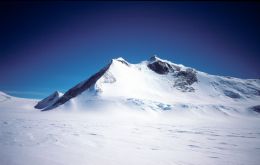
Britain has a new highest mountain after new data showed measurements from old overland surveys were inaccurate. It was thought until this point that Mount Jackson was the tallest mountain in the British Antarctic Territory at 3,184m above sea level. However, new satellite data by British Antarctic Survey (BAS) shows Mount Hope is the tallest mountain, at 3,239m.
-
Monday, August 26th 2013 - 08:25 UTC
Rising sea temperature will reduce krill growth habitat in Antarctica

Antarctic krill are usually less than 6 cm in length, but their size belies the major role they play in sustaining much of the life in the Southern Ocean. They are the primary food source for many species of whales, seals, penguins and fish.
